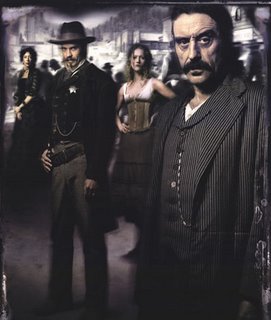
Now that HBO’s “The Sopranos” has finally stumbled to the end of its worst season (by far), the once-scintillating series makes way Sunday night for its successor as not only the best drama on HBO, but arguably the best show on TV, period: “Deadwood.”
If that moniker rings a bell, it’s probably from one of myriad reports about its crass surface. Various media outlets have relished blaring headlines with the number of f-words or c-suckers uttered per episode (I don’t know the actual figures, but the total is surely in triple digits over the course of an hour). If you can get past the profanity, though (and, I guess, the random violence, nudity, and various other forms of depraved “adult content”), “Deadwood” slowly untangles its own complicated storylines to reveal a truly remarkable show. While not as hyped or acclaimed as “The Sopranos,” it’s just as good—maybe even better. The final episode of Season 1, for instance, is one of the best hours of entertainment I’ve ever encountered.
Created and produced by David Milch (who also created another controversial series, “NYPD Blue”), “Deadwood” is set in the late 19th century in the Dakota town of Deadwood, just prior to its annexation into the United States. A camp with no laws and lots of gold, Deadwood draws prospectors from all ranges of society—New York dignitaries to prostitutes, legitimate businessmen to entrepreneurs as corrupt as they come.
And then there’s Seth Bullock, a former lawman from Montana who was so worn down trying to enforce order in the Wild West, he went to the one place he thought he could escape it and live a quiet, unassuming existence. Unfortunately for Bullock, a deep-rooted sense of justice isn’t so easily shaken, and it wasn’t long before he was setting wrongs to rights in Deadwood, no matter how reluctantly. When he stalks down the thoroughfare in fury, eyes ablaze, it gives me chills.
Bullock is played to sizzling, righteous perfection by previous bit-player Timothy Olyphant, who conveys more in one baleful glare than most men could accomplish with a lengthy monologue. Not that there aren’t plenty of monologues in “Deadwood” to go around. In fact, other than the extreme content, another factor in the series’ relative lack of accessibility is the Shakespearean style in which the dialogue is written and delivered—right down to the soliloquies and asides (this aspect of the show is worthy of unabating praise all by itself—the writing is just fantastic).
Perhaps that’s why veteran stage and character actor Ian McShane took so well to his role as saloon owner/proprietor Al Swearengen (an apt name if ever there was one), a wolf in devil’s clothing. Holding court in his second-floor office like the king of England, Swearengen epitomizes the looking-out-for-number-one mentality needed to survive in Deadwood. He’s a complicated man whose deft political machinations are as lethal as his knife, and whose loyalties shift to whomever can serve his purposes best. He’ll fight to the death in one episode, then shake his former combatant’s hand in the next. And, yes, he’s masochistic and just a little bit crazy. But he commands attention, nonetheless.
“Deadwood’s” first 24 episodes are way too complicated to summarize here (in fact, they require such mental effort to watch, I can only take two at a time). Suffice to say, Milch sets these two alpha males—the reserved, honorable Bullock and the over-the-top, profane Swearengen—not only against each other, but against the encroaching (and equally corrupt) United States government; the only thing they hate more than each other, apparently, is someone from outside trying to move in on their territory. Olyphant and McShane are so terrific in these roles, when they share the screen the electricity generated is reminiscent of Pacino-de Niro in “Heat”—and, no, that’s not an exaggeration.
And they’re just two members of a spectacular cast. Brad Dourif (“The Lord of the Rings”) shines as the troubled town doctor; Robin Weigert earned a well-deserved Emmy nod for her alternately touching and hysterical portrayal of Calamity Jane; Paula Malcomson investigates every inch of the mentality of prostitute Trixie; and Molly Parker demonstrates the difficulty of being a woman in a man’s world through the dignified, yearning widow Alma Garret. (It’s also interesting to note that a series as misogynist as “Deadwood” could feature just as many strong female characters as male.)
Look, “Deadwood” certainly isn’t for everyone, otherwise there wouldn’t be a question about whether it’s going to be cancelled after this season. Its Aaron Sorkin-esque political minutiae can even be wearisome to the most dedicated of fans. But if you can somehow cope with the brutal violence and rampant curse words (all necessary to effectively set the atmosphere and realism, mind you (and McShane turns use of the f-word into an art form)), what you’ll find is a remarkably humane series with a heart of gold. Unlike “The Sopranos,” "Deadwood" is populated with plenty of people to love.




1 comment:
hey man, there's always "The Girl Next Door", lol
Post a Comment